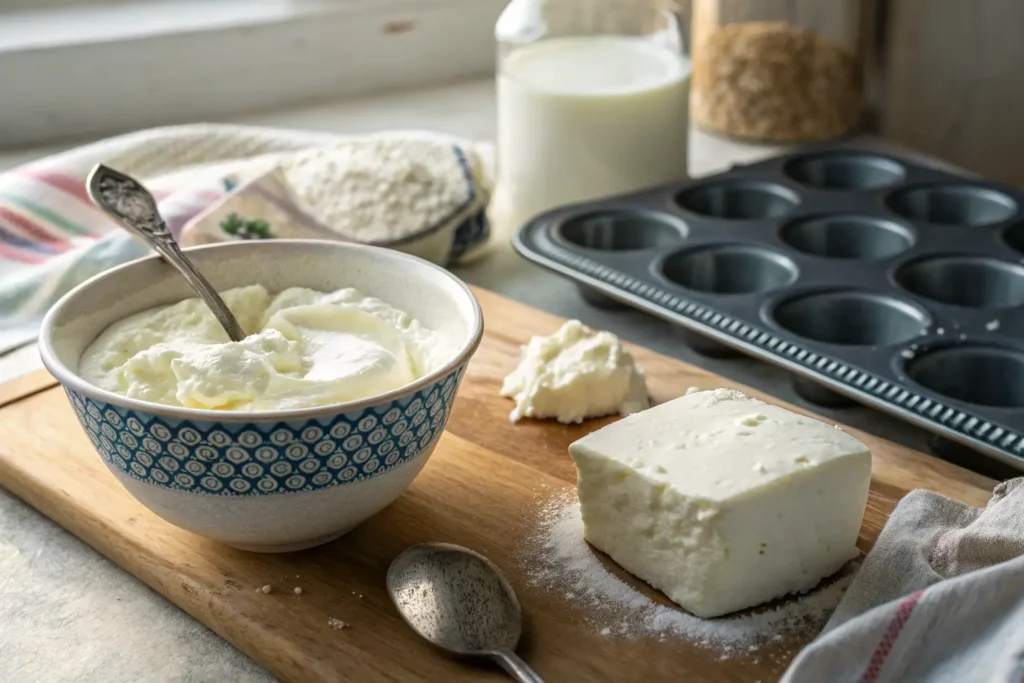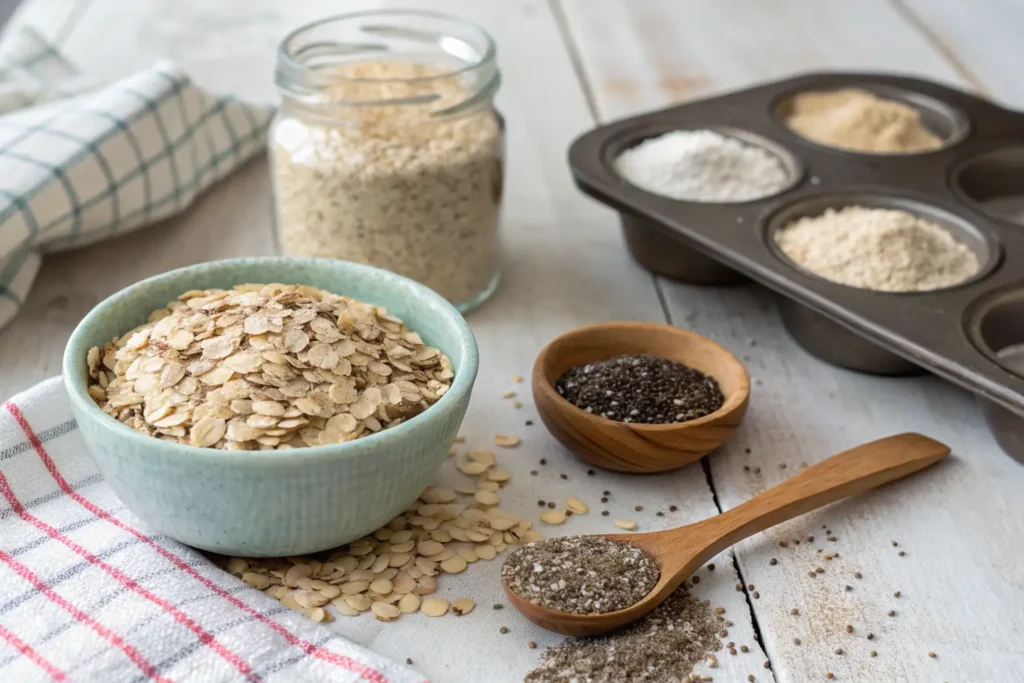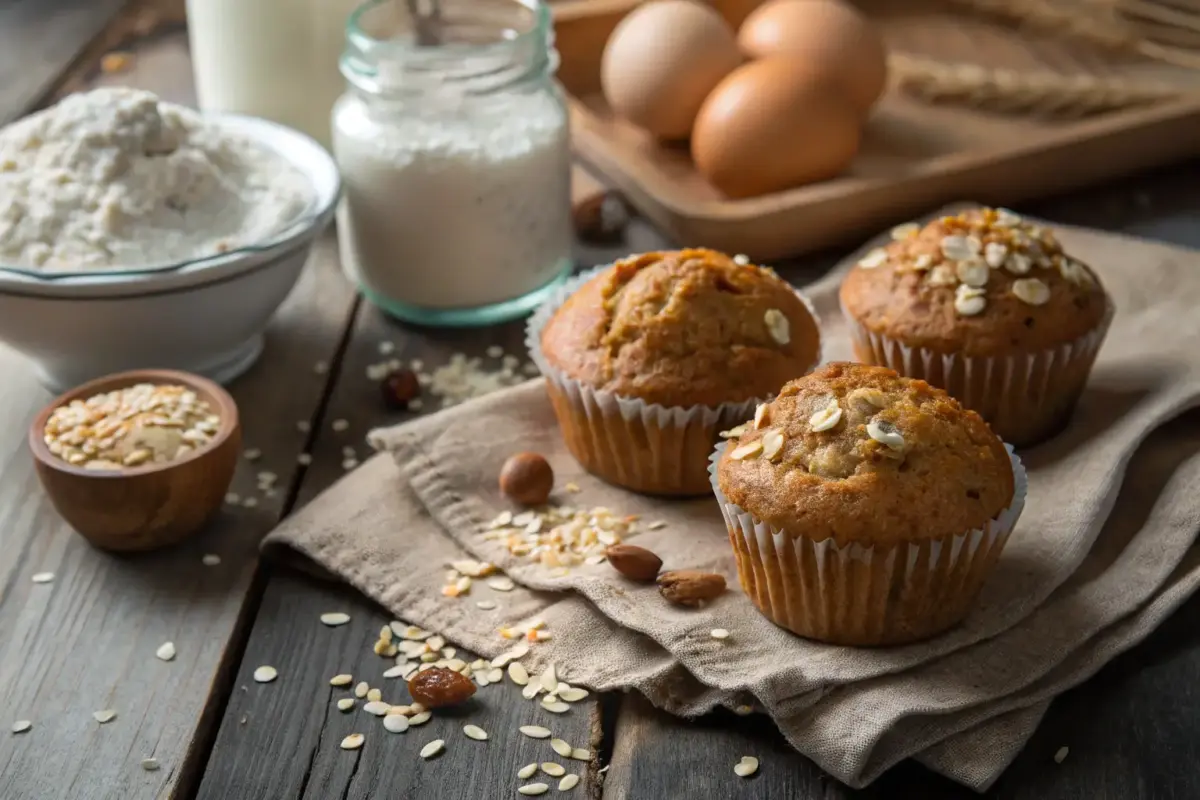Introduction to Protein Powder Alternatives in Baking
If you’ve ever wondered, “What can I substitute for protein powder in muffins?” you’re not alone. Many bakers find themselves without protein powder or prefer natural alternatives. The good news? You can easily swap it out without compromising on flavor, texture, or nutrition. Protein powder is often used in muffin recipes to increase protein content, but it’s not always the best choice—some dislike the chalky taste, while others want cost-effective or allergen-friendly options.
For example, you might be curious about how much protein is in a pumpkin muffin when using natural substitutes. Thankfully, there’s a world of options available. From dairy-based ingredients like Greek yogurt and cottage cheese to plant-based alternatives like chickpea or almond flour, each choice has unique benefits. Whole food substitutes like eggs and oats also add protein while keeping your muffins moist and flavorful.
Why Use Substitutes for Protein Powder in Muffins?
Understanding Dietary Preferences and Restrictions
The first thing to consider when thinking about what to substitute for protein powder in muffins is your dietary needs. Many people avoid protein powder because it often contains allergens like dairy or soy. Others might have personal dietary choices, such as following a vegan or whole-food diet. By using natural, whole food ingredients like eggs or almond flour, you can customize your muffins to suit different preferences and restrictions without sacrificing protein content.
Cost-Effective Alternatives to Protein Powder
Protein powder can be pricey, and let’s face it—if you’re not using it regularly, it’s easy to let it go to waste. This brings us to another common question: “What can I substitute for protein powder in muffins that’s budget-friendly?” Ingredients like oats, Greek yogurt, or even cottage cheese are cost-effective and easy to find.
For those who might still want to use protein powder occasionally, you can explore ideas like adding protein powder to boxed muffins for convenience and nutrition. Not only will you save money, but you’ll also reduce waste by using items you likely already have in your kitchen.
Enhancing Texture and Flavor Without Protein Powder
Let’s be honest—some protein powders leave baked goods with a chalky or dense texture. So, when considering what to substitute for protein powder in muffins, think about flavor and texture. Natural substitutes like almond flour or Greek yogurt add richness and moisture to muffins, making them more enjoyable to eat. Plus, they often enhance the overall flavor profile, whether it’s a banana nut muffin or a chocolate chip classic.
Now that we’ve covered why you might want to swap out protein powder, let’s dive into specific substitutes in the next section. Dairy-based options like Greek yogurt and milk powder are not only high in protein but also help create tender, fluffy muffins.
Dairy-Based Protein Substitutes for Muffins

Greek Yogurt: Creamy and Protein-Packed
If someone asks, “What can I substitute for protein powder in muffins?” Greek yogurt should be one of your top answers. It’s creamy, high in protein, and keeps your muffins moist. Plain, unsweetened Greek yogurt is the best option because it doesn’t overpower the flavor of your muffins. To use it, simply replace part of the liquid in your recipe with an equal amount of yogurt. Whether you’re baking blueberry or chocolate chip muffins, Greek yogurt will add a subtle tang and a fluffy texture.
Cottage Cheese: A Smooth Blend for Baking
Another excellent dairy-based alternative is cottage cheese. For those wondering, “What can I substitute for protein powder in muffins?” this ingredient offers a protein boost and a mild flavor. The key is to blend it into a smooth consistency before adding it to your batter. This ensures your muffins stay tender and free of lumps. Cottage cheese works particularly well in savory muffins or those with bold flavors like banana or pumpkin.
Milk Powder: Adding Protein and Sweetness
Milk powder is a convenient, shelf-stable option that fits perfectly when you’re thinking, “What can I substitute for protein powder in muffins?” Adding a few tablespoons to your dry ingredients increases the protein content while contributing a mild sweetness. It’s an easy option for those who want to avoid liquid substitutions and keep their recipe ratios intact. Milk powder pairs beautifully with chocolate or nut-based muffins.
Plant-Based Alternatives for Protein Powder
Nut Flours: Almond and Cashew Varieties
For those who prefer plant-based baking, nut flours like almond and cashew are fantastic answers to “What can I substitute for protein powder in muffins?” These flours are naturally high in protein and add a delicious, nutty flavor to your muffins. Almond flour, for example, makes your muffins moist and rich, while cashew flour has a slightly sweeter taste. Both work best when combined with another flour, like oat or all-purpose, to maintain the right texture.
If you’re looking for inspiration, check out these protein pumpkin muffins that showcase how you can create high-protein baked goods without using traditional protein powder.
Chickpea Flour: High-Protein and Gluten-Free
Chickpea flour is another excellent plant-based option for anyone asking, “What can I substitute for protein powder in muffins?” It’s naturally high in protein and fiber and works well in both sweet and savory muffin recipes. To avoid a gritty texture, sift chickpea flour before adding it to your batter. Its mild, earthy flavor pairs well with spices like cinnamon or nutmeg.
Lentil Flour: A Fiber-Rich Option
Lentil flour might not be as widely known, but it’s a powerful answer to “What can I substitute for protein powder in muffins?” Packed with protein and fiber, it adds a hearty element to your muffins. Lentil-flour works particularly well in bold-flavored recipes like chocolate or gingerbread muffins. Start with small amounts and adjust based on your taste preferences.
Whether you prefer dairy-based options like Greek yogurt or plant-based choices like almond flour, there are plenty of substitutes that answer the question, “What can I substitute for protein powder in muffins?” In the next section, we’ll explore whole food ingredients and how to adjust your recipes for even better results.
Whole Food Ingredients as Protein Sources

Eggs: The Classic Baking Protein
If you’ve been asking, “What can I substitute for protein powder in muffins?” eggs might be the easiest answer. Eggs are a natural protein source that also bind ingredients together and help muffins rise. They’re a classic choice for baking because they add structure and moisture. If your recipe already calls for eggs, you don’t need to change much—just rely on them as your main protein source. For a plant-based alternative, mix 1 tablespoon of flaxseed or chia seed with 2.5 tablespoons of water to replace one egg.
Oats and Oat Flour: Versatile and Nutritious
Oats are a pantry staple that often comes to mind when you wonder, “What can I substitute for protein powder in muffins?” They’re not only high in protein but also rich in fiber, making your muffins more filling and nutritious. Blend rolled oats into a fine flour or use pre-made oat flour for a smooth texture. You can replace a portion of regular flour with oat flour for a heartier muffin that’s still fluffy and moist. Oats work especially well in recipes featuring fruit, like apple cinnamon or banana muffins.
Quinoa Flour: A High-Protein Grain Alternative
Quinoa flour is a lesser-known but powerful alternative for those asking, “What can I substitute for protein powder in muffins?” It’s naturally gluten-free and high in protein, making it a great choice for healthy baking. Quinoa-flour has a slightly nutty flavor, which pairs well with chocolate or spiced recipes. Because it’s quite absorbent, you may need to adjust the liquid in your batter slightly to keep the texture just right.
Enhancing Protein Content Naturally
Seeds: Chia, Flax, and Sunflower Options
Seeds might be small, but they pack a protein punch. If you’re still wondering, “What can I substitute for protein powder in muffins?” consider adding chia, flax, or sunflower seeds. Chia and flax seeds can be ground and mixed into your batter for added protein and fiber. Sunflower seeds add a nice crunch and a subtle nutty flavor. You can also sprinkle seeds on top of your muffins for extra texture and visual appeal.
Nuts: Crushed or Ground for Extra Protein
Nuts are another excellent answer to “What can I substitute for protein powder in muffins?” Almonds, walnuts, and pecans are all rich in protein and healthy fats. Crush or grind them to mix directly into your batter or use them as a topping. Nuts add a wonderful crunch and boost the overall protein content of your muffins. Just remember to adjust the liquid slightly, as nuts can absorb moisture.
Adapting Recipes for Better Results
Adjusting Liquid Ratios with Substitutes
When you’re using substitutes for protein powder, it’s important to tweak the liquid ratios in your recipe. For example, if you’re adding Greek yogurt or cottage cheese, you might need less milk or water because these ingredients are already moist. On the other hand, flours like quinoa or chickpea are absorbent, so adding an extra splash of liquid can keep your batter from becoming too dry.
Balancing Sweetness and Flavor
Some substitutes, like milk powder or almond flour, naturally add sweetness to your muffins. Others, like lentil or quinoa flour, may introduce a savory or earthy taste. The best approach is to taste your batter and adjust the sugar or spices to suit your preferences. With a little tweaking, you can achieve the perfect balance of flavor and nutrition.
FAQs
What can I use instead of protein powder in baking?
Great substitutes include Greek yogurt, eggs, almond flour, chickpea flour, or oats. These options are rich in protein and work well in muffin recipes.
What can I use if I don’t have protein powder?
Whole food ingredients like milk powder, quinoa flour, nuts, or seeds are excellent alternatives. They’re easy to find and provide plenty of protein for baking.
What is the alternative for protein powder?
Natural alternatives include Greek yogurt, cottage cheese, lentil flour, or oat flour. These substitutes are versatile and perfect for adding protein to muffins.
What does protein powder do in baking?
Protein powder adds structure, protein, and density to baked goods. Substitutes can achieve similar results while improving texture and flavor.
Conclusion: Choosing the Best Substitute for Your Needs
When someone asks, “What can I substitute for protein powder in muffins?” the answer depends on your baking goals. Whether you want more protein, better texture, or allergen-friendly ingredients, there’s a substitute that works for you. Dairy-based options like Greek yogurt and milk powder are great for protein-packed muffins with a creamy texture. Plant-based alternatives, like almond flour and chickpea flour, are perfect for those avoiding dairy or gluten.
Whole food ingredients, such as eggs, oats, and quinoa flour, provide natural protein and keep muffins moist and nutritious. Adjusting liquid ratios and balancing sweetness ensures your recipes turn out just right. The key is experimenting with different options to discover what works best for your taste and dietary needs. With these substitutes, you can bake delicious, high-protein muffins without ever needing protein powder. So, grab your whisk and start baking—naturally!

